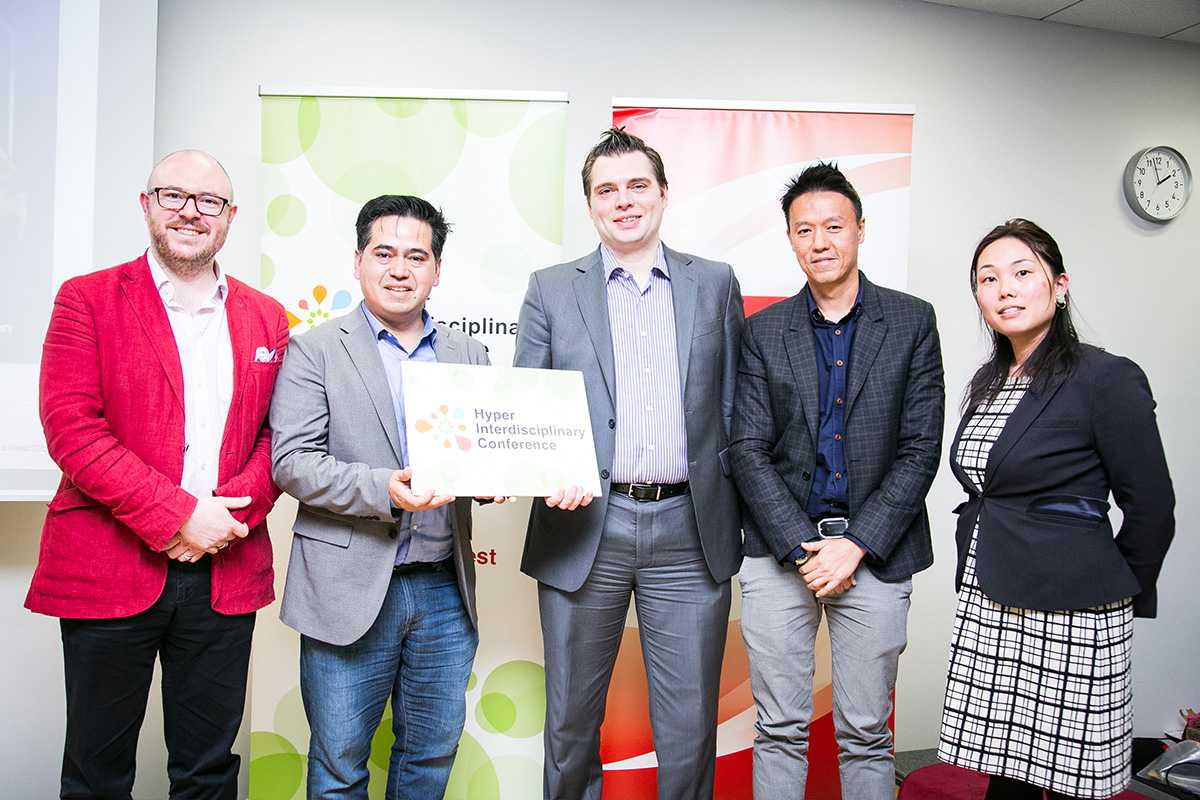Digest of the 8th Annual Conference] What is the Global Trend of Deep Tech?
2020.02.20
From left to right: Jack Wratten (Leave a Nest United Kingdom/Moderator), Jovan Rebolledo (Singularity University), Brian Miller (uFraction 8), Kelvin Ong (Focustech Ventures), Satomi Maeda (Liberace)
Is there a universal approach to accelerating deep tech?
<2019年開催・第8回超異分野学会ダイジェスト>
While interest in deep tech is growing around the world, it is true that there are still some unknowns about its future growth potential. Is there a universal solution to this approach, or is localization important? ......
In this session, founders of accelerators and technology ventures from Japan, Southeast Asia, Europe, and the United States will discuss the future direction of deep tech.
The 9th Annual Hyperdisciplinarity Conference will be held online on April 23, 2020.
Solving the world's food problems through breakthroughs in filtration systems.
Jack Wratten(Leave a Nest United Kingdom)
Hello everyone, I'm Jack Wratten, Director of Libanes UK. I am Jack Wratten, Director of Liverness UK. I also run an incubator in the UK called BLOOM.SPACE. I originally worked as a biochemist at University College London for about 10 years. I then worked for small companies and charities before returning to the university and setting up a program to educate young people about business in Europe and Africa. I then went on to found BLOOM.SPACE.
So, I am the type of person who has done a lot of different things, and I am hoping to hear from the speakers today about their expertise on deep tech. First of all, could each of you introduce yourselves, starting with Mr. Jovan?
Jovan Rebolledo(Singularity University Japan)
Hello everyone, my name is Jovan Rebolledo. I was born in Mexico and have dual citizenship with the United States. I first came to Japan in 2002, when I was a JICA trainee.
To briefly introduce myself, I am someone who originally studied computer science, computer engineering, robotics, AI, neural networks, informatics, etc. In 2009, I joined Cingularity University's GSP (Global Solutions Program (GSP) at Singularity University in 2009, and I have been involved with the university ever since. In Japan, I am an ambassador for Singularity University and have organized the GIC (Global Impact Competition) for the past several years. I also teach a course on AI at the University of Tokyo.
I was an AI and Robotics faculty member at Singularity University from 2014-2017, which was a really interesting experience, because through helping over 50 companies implement their core technologies, I really gained a lot of insight into "how to translate ideas into real technologies, products and services". I gained a lot of insight into how to translate ideas into actual technologies, products, and services through helping more than 50 companies implement core technologies.
That is why I am looking forward to working with you today.
Jack Wratten
Thank you, Jovan. Now, Brian, please go next.
Brian Miller(uFraction 8)
Hello everyone, I'm Brian Miller, founder and principal of uFraction 8, a Scottish start-up company. My name is Brian Miller, founder, principal and developer of the core technology of uFraction 8, a Scottish startup company. I am a mechatronics and engineering graduate with experience in gas turbine control and instrumentation.
What kind of company is uFraction 8? We consider ourselves to be the company that has achieved the biggest breakthrough in "filtration systems," so to speak, in the past 150 years. Specifically, uFraction 8 has developed a technology that enables very small microfluidic devices commonly used as diagnostic and laboratory equipment to be utilized in industrial-scale processes by layering them.
The reason why these technologies are so important is that they have a great deal to do with the issue of "food. It is said that by 2030, for the first time in history, food production will not be sufficient for human survival. At the very least, a large amount of fertilizer will be needed to keep crop production at the current level, and the phosphate-based fertilizers currently in use are not sustainable at all.
Producing more food also means more phosphorus from more fertilizer will run off, causing water pollution. When this flows into the ocean, it leads to algae blooms that are harmful to marine life. We want to change this cycle.
As is well known, microorganisms and bacteria, for example yeast, are used in a wide range of applications such as food, pharmaceuticals, and fine chemicals. The mass production of microorganisms and bacteria has already taken place, but the process has not changed for more than 100 years, and 30~80% of the total cost is spent on this part of the process. The current method is very complex and involves a multi-step process of filtration, flocculation, and centrifugation.
What we are trying to do is to combine these three processes into one. This will significantly reduce manufacturing costs.
We also believe that this technology could be used to produce microalgae in wastewater containing phosphorus and then harvest it before it is released into the ocean. The microalgae could then be returned to the soil as a biofertilizer instead of being mined for phosphorus ore, thus completing the circular economy. We hope that our technology can be used in a broader area, resulting in more economical food production.
So, thank you for your time today.
Singapore is undergoing a government-led industrial transformation.
Jack Wratten
Thank you Brian. Kelvin is next.
Kelvin Ong(Focustech Ventures)
Hello, my name is Kelvin. I run two companies in Singapore, one is a private investment firm called Focus Tech Ventures and the other is a VC firm called TNB Venrures. Then I am also a partner firm of Liverness and Tech Planter.
Our roots are in precision engineering, and we used to manufacture HDD components from Southeast Asia to China. We sold that company and turned it into a private investment company, which then formed a partnership with the Singapore government.
Southeast Asia now has a population of 600 million people, and purchasing power is rising. Many companies are trying to enter this market, and in fact, four unicorn companies have already been created in Singapore. However, none of them are deep tech companies. They are successful companies that have tapped into the potential of the Asian market through so-called "Shallow Tech.
However, this trend is gradually moving toward deep tech. In Singapore, a government-led program called ITM (Industry Transformation Map) is currently being developed to encourage the introduction of innovative business models and new technologies in various industries, with a budget of $4.5 billion.
In this connection, we are also working with Spring Seeds, a Singaporean government agency fund, to invest in the industrial IoT and robotics areas.
Other areas of focus are what we call "untapped areas". These are areas where innovation and technology are not being invested in to the tune of 1% of a company's revenues. One example is the shipping industry, where we are currently working with a major company to establish a fund.
Similarly underdeveloped in the adoption of technology is the construction industry. Here, concrete moves have already begun. One is called IDD (Integrated Digital Delivery), which can save a great deal of money by implementing AI and IoT from the design phase to site management. The other is called DfMA (Design for Manufacturing and Assembly), which involves bringing cutting-edge technologies from the manufacturing industry to the construction industry.
That is why I hope to talk today about perspectives on how to introduce technology into these areas.
Jack Wratten
Thank you Kelvin-san. Lastly, Mr. Maeda, please.
Satomi Maeda (Liberace)
Hello everyone. I believe my role in this session is to bring an "educational" perspective. And I would like to share the keyword "excitement" with you all.
To briefly introduce my background, after graduating from high school in Japan, I moved to the U.S. and earned a doctorate in ergonomics and psychology. Along with my research, I also worked as an academic advisor, but that experience made me want to get involved in "schools" in a way other than as a researcher, and I joined LIVERNESS in 2010.
Now, Japanese education used to be more memory oriented, but recently it has become more about how to apply knowledge. In addition, skills such as communication and leadership in group work are required, as well as the ability to deal with "unanswerable questions.
You may have the impression that LIVERNESS is a company that supports tech ventures, new businesses and innovation, but our education business is also one of our main businesses. In addition to simply providing educational services, we have established an in-house Education Research Center, of which I am also the director. We are working with companies and schools to develop new educational methods and promote them.
One project we are currently working on, for example, is the theme "How to be an Otaku for Life". There are probably a number of "super nerds" in this venue. In a good way, of course (laughs). We want to build a framework to nurture those next generation of super otaku.
The second is conducting research on what motivates students to "take the first step forward". Many students are interested in something, but rarely take action. We believe that by measuring what makes them take that step forward, we can help teachers evaluate their students' motivation to learn.
Another thing I would like to tell you about is the "WAK WAK" project. The Japanese word "wak wak" (waku waku) is not yet in the English dictionary, but we are planning to put it next to KARAOKE if possible (laughs).
Excitement is the state of being excited about something, but it is not just excitement, there is also an itching to "actually act" on it. Excitement also has the power to influence the excitement of others. For example, if a teacher is excited about teaching, the excitement will spread to the students in the classroom, and it will also be able to make the entire classroom excited.
And, and this is important, excitement should be able to foster the next generation of "super geeks" and ultimately contribute to deep tech. I hope to participate in the discussion today from that perspective.
Jack Wratten
Thank you all. With such a very diverse group of perspectives, I think it is time to get into the discussion.
Deep Tech is "exponential technology.
Jack Wratten
The theme of this session is "Is the movement to accelerate deep tech something that is common around the world?" and "Are there common ways to do this?" First, can you tell us about your respective definitions and understandings of deep tech?
Jovan Rebolledo
In Singularity University's view, deep tech means "exponential growth technology applied to solving global problems. Stated differently, it means technology that can have an impact on the scale of 1 million, 10 million, or 1 billion people.
Examples of exponential technologies include AI, robotics, nanotechnology, and digital biology. Hybridizing these technologies with existing technologies can amplify their effects and ultimately have a positive impact on many people. We believe that is what Deep Tech is all about.
Brian Miller
That is a very good definition. This is my own theory, but the work that doubles the existing capacity of anything is created by a completely new realization. I always think that "utilizing something existing" is equal to "creating a completely new assembly.
Jack Wratten
I see. Kelvin from Singapore, do you have a different perspective on deep tech?
Kelvin Ong
The definition of deep tech in Singapore, and ASEAN as a whole, is not that different from the traditional one. It is more about scientific breakthroughs, engineering-enhanced innovation, and technology that is robust as intellectual property.
However, from an investor's perspective, there are a few things that come into play that need to be considered. For example, most funds are managed on an 8- to 10-year basis, which tends to mean that there are not many technologies out there that require a longer time horizon than that.
On the other hand, as I mentioned earlier as an example, a whole new "house building" is being envisioned in the construction industry through various cutting-edge technologies such as 3D printers and robotics. In talking with other VCs, we are really seeing a variety of moonshot ideas in this area.
However, when I actually go out to construction sites, I find that they are still trying to design using conventional technology and do not seem to be on the cutting edge. I believe that a real breakthrough will probably occur when onsite expertise and cutting-edge technology are fused together.
Therefore, as a fund, we are investing in applied deep tech rather than highly specialized technology.
Innovation in the "Age of Connections."
Jack Wratten
Maeda-san, is there anything you would like to add from an educational perspective or in relation to young people?
Satomi Maeda
Deep tech really requires a lot of trial and error to reach a prototype, and it also takes a long time. It is necessary to formulate a hypothesis for a problem for which there is no answer, and to repeat the cycle of brushing up the solution through trial and error as many times as necessary.
However, this kind of process itself is not something that you would be exposed to for the first time in a graduate doctoral program. It should be possible in high school, middle school, or even as early as elementary school. In the long run, I believe that such experiences are the most important catalyst for the development of deep tech.
Jack Wratten
I see, so you are saying that deep tech, entrepreneurship and innovation are content that should be educated in schools. If that is the case, then national education policy will play a major role. Going one step further, what role will the government play in the development of deep tech?
Brian Miller
In the UK, the government plays a really big role. Because research institutes and universities are funded by the national budget. So I think it is important for the country itself to be stable to foster innovation. If something like Brexit happens, you can't plan, you can't be sure of your decisions, and the evolution of deep tech will slow down.
Jack Wratten
Certainly, instability in the national situation may be a test for innovation. On the other hand, isn't it also true that innovation occurs when it is necessary?
Brian Mille
Indeed, it is sometimes said that "war is the father of invention," and there may be nothing better than survival situations in terms of necessity. However, today is the age of "connection," and the key should be how well we can utilize various relationships. If this is the case, it is hard to imagine that productivity will be enhanced by unstable national conditions.
The company's educational activities are "intergenerational open innovation.
Jack Wratten
In your experience with deep tech acceleration, what have you found to be effective?
Jovan Rebolledo
From what I have seen, I have the impression that a hungry spirit is important. People have their own reasons, such as "I want to become a billionaire," "I want to help the poor in Africa," "I want to change the world," etc., but people with such a strong hungry spirit tend to create interesting innovations. Perhaps that is the power of excitement.
However, there must be people all over the world who have a hungry spirit, but whether or not it blossoms as innovation depends on whether or not there is development work, such as private investment, involved.
Brian Miller
You are right. However, while the availability of capital is of course important, on the other hand, I think that education, which we have been talking about, is another major factor. Because great success in deep tech usually comes from areas where quality education is provided.
Jack Wratten
I would love to hear your thoughts on this point, Maeda-san.
rice field in front of a temple's main hall
One of Liberace's success stories is that we have brought large companies into the field of education. We have brought large companies with abundant technology and know-how into the field of education to conduct project-based learning programs on their cutting-edge technologies, or to work with high school students to find solutions to problems facing the company.
By doing so, the students are exposed to cutting-edge technology, and the companies are able to obtain innovative ideas from the high school students, which is mutually beneficial. To repeat what I said earlier, in the long run, this is a model for fostering the next generation of deep tech reserves.
Jack Wratten
I see what you mean by "intergenerational open innovation," Kelvin.
Kelvin Ong
Singapore and Southeast Asia may not be in that situation yet. Companies are so focused on running their businesses that they do not seem to have reached the point where they are involved in the education of children.
If anything, there is a strong perspective that growing the company itself will create future jobs, or that if the company has the funds, it will be able to secure human resources. As we face competition from other countries such as China, we tend to be conscious of such things.
But you are right. Education for children is essential to continue developing technology in the future and to nurture the start-up talent that will enable economic growth in the future. In this sense, I think it will be important for us to work with another ecosystem like Japan.
The era of democratization of innovation has arrived.
Jack Wratten
From here, I would like to again consider the question of how deep tech can be created. Earlier you mentioned that "schools can help with this," what do you think, Jovan?
Jovan Rebolledo
After all, it all starts with "passion," doesn't it? The object of your passion may be something you have a strong interest in, or something that is bothering you.
Then, it is very important to understand what the problem is. Once that is understood, it is possible to find the technology to solve the problem. Then, by combining various exponential technologies and repeating trial and error, we can create a product or service and present it to the world. This is the full cycle of innovation.
Brian Miller
To add a little more, not everyone on the team needs to be passionate, but it is good if the leader can share his or her passion with the team. I also think it is important to be able to find the right people and form the right team. In my case, meeting my co-founder Monica was the first big step in moving the business forward.
In forming a team, there needs to be a good mix of skills and abilities among the members, yet everyone needs to be aiming in the same direction. Passion is important because without it, strong leadership is not possible, but I rather think that creating the "connection" and building the team is the most important part of deep tech.
Also, as I am sure is recognized around the world, what was taught in the past 10 to 20 years is by no means the same as what will be required in the next 10 years. This means that in order to innovate in the future, it will be essential to connect with young people.
Jack Wratten
I see. If I were to summarize the second half of this session, I would say that while higher education definitely leads to innovation, it is not something that is fostered only in research institutions, but that there are opportunities for it at all points in life. And, as Brian just said, in order to form a team that will have an impact on society, young people are in fact important. In conclusion, it seems to me that we need to have an ecosystem where those elements overlap.
Jovan Rebolledo
To add an example to what I just said, the winner of the X-Prize competition for "Recovering Crude Oil from Seawater" was a high school student who made a breakthrough that no professor at MIT or Harvard had ever made before. In other words, in today's innovation, there is a very democratic area where anyone can make a breakthrough.
Jack Wratten
That's great. Let's look forward to further democratization of innovation in the future. That concludes this session. Thank you all very much.

Managing Director, uFraction 8 Limited
Dr. Brian Miller
D. from the University of Edinburgh. He specializes in industrial process automation. He founded uFraction8 after winning the Royal Society of Edinburgh Enterprise Fellowship at Heriot Watt for the cell separation technology he invented during his studies. uFraction8 won the top prize at TECH PLANTER in the UK in 2017. He is currently working on a prototype development project with Hamano Seisakusho, a town factory in Sumida-ku, Tokyo.

Singularity University Japan GIC Organize
Dr. Jovan Rebolledo
D. from Kanazawa University in 2009. M. in Business Administration from the University of Louisville, USA. He has experience in numerous entrepreneurial ventures related to robotics and artificial intelligence. He has served as an advisor to numerous venture companies in Japan, Silicon Valley, and Mexico. He was one of the first students to join the GSP of Singularity University and has since been deeply involved in the Singularity University's activities in Asia.

CEO, Focustech Ventures
Mr. Kelvin Ong
CEO of FocusTech Ventures, which focuses on investing in seed-stage technology ventures, Mr. Huang has over 15 years of experience in precision engineering and is an Executive Director of Focus Tech Holdings, a global hard disk driver component manufacturer. a global hard disk driver component manufacturer. He will provide an update on the current state of technology startups in Singapore.

Director, Center for Comprehensive Education and Research, Riverness, Inc.
Satomi Maeda(Satomi Maeda)
After graduating from high school, he moved to the U.S. He earned his master's and doctorate in ergonomic psychology from Wright State University. 2010, he joined LIVERNESS, where he was involved in human resource development planning and development. In May 2013, she joined the International Development Division, where she has been engaged in the development of teacher training programs and international education programs for junior high and high school students. Working together with.

Director, Leave a Nest United Kingdom Ltd.
Mr. Jack Wratten
He started his career as a biochemist at the prestigious University of London before moving into the world of startups and social entrepreneurship. Based on his experience, he established an incubation center, BLOOM.SPACE, across the street from the University of London to support budding entrepreneurs. In April 2018, he joined Leave a Nest United Kingdom Ltd. as Director.

